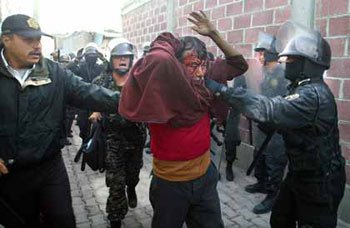|
Edited on Fri May-19-06 01:12 PM by Breeze54
The “Dirty War” Returns to Mexico
San Salvador Atenco Attacks Follow Blueprint of Terror from the 70s and 80s
By John Ross
Blindman’s Buff
May 18, 2006
MEXICO CITY (May 20th):
Between 1970 and 1982, three Mexican presidents waged a “dirty war” against dissidents
from one end of the country to the next. Recently compiled documentation lists 15,000
illegal detentions during that terrible period, thousands of instances of torture,
and the forced disappearance of more than 700 Mexican citizens
(see “Disappearing the Disappeared” upcoming next week).
Nowhere was the dirty war more cruelly fought then along the Pacific coast of Guerrero
state where farmers had risen in rebellion behind the rural school teacher-turned
guerrillero Lucio Cabanas and his Party of the Poor.
Carlos Montemayor, author of “War In Paradise,” perhaps the most vehement expose of that
repression, is an assiduous scholar of how the dirty war in Guerrero was organized and
carried out.
Writing in the left daily La Jornada, Montemayor recently described the characteristics
of that counter-insurgency campaign against farming villages along the Guerrero coast,
and the striking similarities to the May 4th assault on San Salvador Atenco just outside
of Mexico City by thousands of highly militarized police to quell a campesino rebellion.
According to Montemayor’s description, first an overwhelming force is assembled with
the primary mission of totally subjugating a recalcitrant population.
Then informers are introduced into the village to identify and eliminate rebel community
leaders and those associated with them. If the leaders evade capture, their families are
held hostage. Young men are rounded up and selectively tortured to extract information
and to turn them into “soplones” (informers.)

Meanwhile, shock troops terrorize the civilian population into submission.
Indiscriminate beatings, home invasions, the theft of personal items of value,
and the systematic destruction of property are encouraged by police commanders.
Women are raped and sexually abused to underscore the occupation force’s total
domination over the rebellious villagers.
Virtually all of these dirty war characteristics were on display in San Salvador Atenco
May 4th when 3000 armed state police and elements of the Federal Preventative Police (PFP),
a force largely extracted from the Mexican military, slammed into that dirt-poor town of
30,000 out on the dried lake beds east of the capital, killing one 14-year-old,
leaving a 20-year-old student hovering between life and death, and arresting 209,
all of whom required hospitalization from the beatings they received under security force
batons – although only some prisoners actually received it (and they were chained to their
hospital beds.)
Of 47 women arrested, 23 reported that they had been raped or were otherwise sexually abused.
One 53 year-old mother who had gone to a local store to buy a birthday present for her son
was forced to perform oral sex on three police “officers” to avoid arrest.
Those arrested included farmers and farm women, human rights observers, lawyers,
alternative reporters, non-Mexicans, and adherents of the Zapatista Army of National
Liberation’s Other Campaign who had traveled to San Salvador Atenco in solidarity at the
urging of former EZLN Subcomandante Marcos, now doing business as Delegate Zero.
All were originally held on charges of participating in an organized criminal conspiracy,
a crime that mandates a 20-year sentence.
One object of such collective repression, ... more at link...http://www.narconews.com/Issue41/article1831.htmlRecommended Reading -->http://www.narconews.com/docs/welcome.htmlThe American Nightmare
The nations of Latin America -- each standing alone before the US imposed
war-on-drugs -- are out-hollered and out-dollared, but not outsmarted.
"The badly informed North American public," as one Mexican columnist terms
the phenomenon, has little idea to what degree the hemispheric "consensus"
that certain drugs ought to be prohibited has collapsed in recent years.
This newsletter relays what the Mexican and Latin American press is saying
about the drug war. Many of these stories will appear to English-speaking
readers as out-of-context to the media-driven "consensus" within the United
States regarding the drug war.
These stories are not reported in the United States or other world powers:
the very nations that pride themselves on freedom of the press.
Why not? Ineptness? Intent?
The imposed silence of a market-driven media? Each of these ills is a factor
and Narco News will take no prisoners in afflicting the comfortable members
of the Fourth Estate, one at a time, for their role in the whole mess.
Artificially created consensus - based on untruths and lack of information -
always breaks. Each time it shatters, that fracture is called history.
The Narco News Bulletin does not claim objectivity: we are out to break the
manufactured consensus north of the border, where the illusion that the drug
war is about combatting drugs remains the dominant discourse.
In the South, as the stories we translate and summarize demonstrate,
a new consensus, based on the reality of drug prohibition between nations and
peoples, is already under construction. The Narco News Bulletin likewise seeks
to comfort the afflicted members of the press who practice authentic journalism.
Latin American journalists (and a very few conscientious gringos), living daily
at the drug war front and facing greater danger than the desk jockeys of the mass
media, are doing a better job at covering the problem than those who have grown
soft in the land of the First Amendment.
By alerting the English-speaking world to the work being done by many Latin
American journalists (American journalists, Simón Bolívar might have corrected),
Narco News aims to force these stories - and more honest drug war coverage overall
- onto the docket of the US media.
There's more -
The American Dream of Bolívar...
Why We Focus on Mexico...
Welcome to our Dream...
|